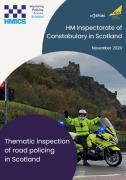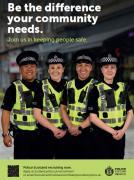REVIEW CALLS FOR IMPROVEMENTS IN POLICE STOP AND SEARCH APPROACH
31st May 2014
The Scottish Police Authority has today published 12 recommendations aimed at improving the targeting, effectiveness, and transparency of the use of stop and search tactics by Police Scotland.
Publishing the results of its scrutiny review of stop and search, the SPA has acknowledged the contribution that stop and search makes to tackling violence and antisocial behaviour in Scotland.
However, it has highlighted a number of areas for improvement around targeting, proportionality, training, data gathering, transparency and consent.
Key recommendations include:
- improved data collection and analysis by Police Scotland, to make stronger the connection between intelligence, the threat of crime, and the stop and search activity undertaken.
- increased public reporting of stop and search data to enhance transparency and build public confidence.
- a shift towards informed consent in non-statutory stop and search to ensure the public are better informed of their rights, including the right to decline.
The review also highlights the need for wider policy consideration within the criminal justice system around the lack of statutory powers to search for alcohol, and the need for more research on the long-term impact of stop and search on particular groups and communities, especially younger people.
The review found that:
- Police Scotland annually invest approximately 250,000 hours of police officer time to stop and search;
- stop and search activity does contribute to detecting and preventing criminal and antisocial behaviour, but It is not always clearly set out, for officers or communities, where the objective of stop and search in an area is to deter crime or where it is to reduce crime;
- there is no evidence of the disproportionate targeting of minority ethnic communities in Scotland;
- there has been a substantial fall in the number of stop and searches carried out in Glasgow, offset nationally by considerable increases in volumes in command areas in the north and east of Scotland;
- those young people aged 15-19 years are most likely to be stopped, with 223 children aged 9 or under also recorded as having been stopped and searched;
- although there is no statutory search power for alcohol, the majority of searches are for alcohol and the majority of detections are for alcohol (12 times the recovery rate for weapons);
- while most officers were clear of the need to target activity on the right person, in the right place at the right time, some officers perceived pressure to conduct a certain number of searches, and;
- the extent to which stop and search contributes to falling violence is not clear, with areas such as Grampian and Strathclyde experiencing comparable falls in violent crime with very different rates of stop and search activity.
Brian Barbour, the SPA member who chaired the scrutiny task group, said:"Our review has concluded that stop and search is a useful police tactic and makes a positive contribution to tackling violence and anti-social behaviour in Scotland's communities.
"But there are areas we identify in the review which are less clear cut, and which we have questioned. As a society, we must not shy away from asking whether it is appropriate to carry out a non-statutory stop and search on a child of nine.
“We make a number of recommendations which, if implemented, we believe will improve policy, practice, and outcomes.
“The golden thread running through those recommendations is the need for a step change in knowledge and awareness - within policing, and more widely in our society.
“We need to collect better data and analyse it more, and to make stronger the connection between intelligence gathered and the activity undertaken. We need to increase the transparency of reporting and publication of stop and search data.
“People need to be better informed of their rights, including the right to decline non-statutory search. And we need more research to better understand the longer-term impacts of stop and search on particular groups in our communities, especially younger people.
“And while we do not make a specific recommendation on the ability of officers to search for or remove alcohol, our review highlights that there is a need for wider policy consideration within the criminal justice system around the lack of statutory powers to search for alcohol.
“Police Scotland's tactical police approach to stop and search is built around searching the right people, in the right place, at the right time. We support that approach.
“This report is about making improvements to stop and search. It is not about making judgements on stop and search. We hope that through the work we have done, and working together with Police Scotland on the next steps, we can also reduce the polarisation of views that has grown around this issue in the last year."
NOTES
1. A copy of the SPA report, Scrutiny Review - Police Scotland’s Stop and Search Police and Practice, is available from the following link: www.spa.police.uk
2. There are two types of stop and search in Scotland. Statutory stop and search, which is intelligence-led, does not require consent, and where the power for the search derives from various pieces of legislation. Non-statutory stop and search (sometimes referred to as consensual stop and search) is not provided for in legislation, does not require reasonable suspicion, and does not require individuals to be informed of their right to refuse.
3. The scrutiny review was carried out by a task group made up of SPA members and supported by SPA officers. It involved a desktop review, a data analysis of around one million Police Scotland (and legacy Force) stop and search records, and semi-structured interviews with a sample of operational police officers. Emerging findings were also tested with Police Scotland, Her Majesty’s Inspector of Constabulary in Scotland, Scottish Government policy interests, and the main police staff associations (the Association of Scottish Police Superintendents and the Scottish Police Federation).
4. The review and its recommendations have been endorsed by the SPA today and will now be considered by Police Scotland. The Chief Constable is required by legislation to ensure that the policing of Scotland is done with due regard to any recommendations made or guidance issued by the SPA. A formal response from the Chief Constable is expected to be presented to the Authority’s meeting in August.
Related Businesses
Related Articles
Police - Area Performance Report to Caithness Area Committee on 11 November
A report by the police to the Caithness area committee on 11 November will allow councillors to discuss a range of issues. Chief Inspector Calum Smith - Area Commander (North Highland Area Command) sets out the crime related figures up to June 2024.Police Scotland Urged To Review Its Commitment To Road Policing
A reduction in police activity targeting the most common causes of fatal crashes has been identified as a key factor affecting Police Scotland's ability to keep people safe on the nation's roads. A new report by His Majesty's Inspectorate of Constabulary in Scotland notes that since 2020 the total number of people killed or injured on Scotland’s roads has increased each year.
A836 In Caithness - Average Speed Cameras Go Live Today Monday 2nd September
Police Scotland's North Safety Camera Unit are now operating average speed cameras on the A836 between Reay and Thurso with offences being progressed from Monday 2nd September. In partnership with the Scottish Safety Camera Programme and the Highland Council, the location was identified as having speed concerns and increased traffic volumes, both of which are potential ongoing road safety challenges.
Visiting relatives and friends this Christmas? Make sure your home is safe AFTER DARK
Consider carefully what you are putting on social media, especially if you are staying away to visit friends and relatives this Christmas. Be wary of posting photographs of Christmas parties that contain images of high value jewellery.
POLICE OFFICER RECRUITMENT - CAITHNESS AREA
Would you like to join the Police? Would you like to live and work in the Caithness area? Police Scotland is actively recruiting good quality and eligible candidates specifically for the Caithness area. We are taking applications now for Police Constable / Special Constable Entry for future intakes during 2023/2024.
£74m Police Budget Cut Will Make Communities Less Safe
UNISON, the union for police staff, says Scotland's police budget cut will see even more crime going unreported and crimes not being fully investigated. The union says around 230 police staff could be cut, including fingerprint examiners, forensic examiners, 999 call handlers, custody staff, high-speed driving instructors, cybercrime experts, payroll, HR and IT staff.New Police Commander For Highland And Islands Division Takes Oath
The new Highland and Islands divisional commander will take up post having been sworn in as a Police Scotland officer. Chief Constable Sir Iain Livingstone welcomed and thanked Chief Superintendent Rob Shepherd during a ceremony at Police Scotland Headquarters, Tulliallan, on Monday, 16 January 2023, overseen by Justice of the Peace Gillian Thomson.
Police Complaints, Investigations And Misconduct To Continue After Resignations
Gross misconduct proceedings against police officers should be allowed to continue after they resign from the force to promote transparency and maintain public confidence, according to a public consultation. The move, which would see proceedings continue even if an officer leaves during the course of an investigation into their conduct, was among the recommendations of Dame Elish Angiolini's independent review into how police complaints and allegations of misconduct should be handled.Criminal Proceedings In Scotland 2020-21
The total number of people proceeded against in Scottish courts fell by 46% to 46,497 in the year to 2020-21, according to National Statistics published by Scotland's Chief Statistician today. The number of people convicted fell at a similar rate, down 44% to 42,532.15 Further Call Handling Jobs For Police Centre In Inverness
Cllr Matthew Reiss, Highland Council's Strategic Lead for Police and Fire has welcomed Police Scotland's announcement that it has created fifteen new posts to further enhance the development of call handling services, based in Inverness. He said: "We were delighted in October last year to welcome 25 new jobs in Inverness with the creation of a specialist call handling service team and these fifteen additional new posts based in the Highlands are great news.
